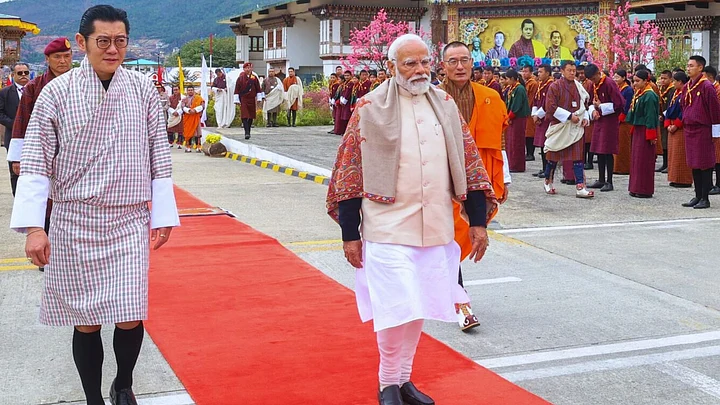Prime Minister Narendra Modi’s visit to Bhutan, even as the election campaign gets underway in India, signals the level to which New Delhi values its relationship with the tiny Himalayan kingdom. Modi was received warmly by his counterpart, Bhutan’s newly elected PM, Tshering Tobgay, and he later called on King Jigme Khesar Namgyel Wangchuck, who conferred on him the Order of Druk Gyalpo. Modi is the first foreign national to be honoured with that.
On the eve of the January elections, the King of Bhutan visited India in November last year and a month later, launched the plan to build a mindfulness city in Gelephu, a town in southern Bhutan. This will be a special economic zone to attract investment, as well as a vehicle for the country to advance its plans for economic transformation.
In March, PM Tobgay visited New Delhi and met both the president and the prime minister. This has been followed up almost immediately by a return visit of Modi to Bhutan. All these are an indicator of the effort made by the leaderships of both countries to tend to what is viewed as an extremely important foreign relationship.
Economic Assistance and Energy Cooperation
An immediate outcome of the visit has been India’s decision to double Indian assistance for Bhutan’s 13th Five-Year Plan to Rs 10,000 crore. India is Bhutan’s top trading partner and provides 50 per cent of its foreign direct investment. The two countries also signed seven MoUs and agreements, while initiating another for rail links between them. The MoUs covered areas like petroleum, trade, digital connectivity, space, and agriculture. The two also issued a joint vision statement on their energy partnership, pledging energy security in the region.
As a major aid provider to Bhutan, India has funded several of its hydropower units and many of them sell clean electricity generated back to India. The Chukha Hydropower Station is a 336 MW project commissioned in 1986-88. This was followed by three more projects Kurichhu, Tala, and Mandechhu. A fifth project at Punatsangchhu II will be commissioned in 2024.
Yet, in a 2022 commentary, Opangmeren Jamir of the Manohar Parrikar Institute for Defence Studies and Analyses, New Delhi, has argued that the model on which India-Bhutan hydropower cooperation has been built “seems to be unravelling.” There has been criticism that it has led to a rise in Bhutan's debt and provided few employment opportunities.
A new model has been developed, but none of the proposed five projects have really taken off. The former Ambassador of India to Bhutan Gautam Bambawale has suggested that “there is a need to go back to the drawing board” to work out a more practical and useful model.
Bhutanese hopes are now residing on the Gelephu Mindfulness City (GMC) project, spread out over 1,000 sq km. They also want to create a “carbon negative” special economic zone that will attract non-polluting companies, IT centres, hospitals, schools, and resorts. They want to shape a vibrant economic hub which will open up new areas of employment for them. Currently, unemployment is very high in Bhutan people are migrating out of the country.
Bhutan is hoping that New Delhi will be fully involved to ensure its success. This would involve not only encouraging investment there but also developing rail and air connectivity to the location which is in a remote part of India’s north-east. This would have spillover benefits for development in India as well.
The Elephant in the Room — China
For its part, India will construct a rail link from Kokrajhar to Gelephu and Banarhat to Samtse, as well as build a new airport to service the area. An Indian proposal to build a road linking Tawang with Guwahati through Bhutan was turned down by the latter because of Chinese sensitivities.
There is no doubt that the elephant in the room is China, which shares a 477 km border with Bhutan, which, like the Sino-Indian border, is disputed in its entirety. Unlike India, Bhutan lacks the capacity to police the border and is facing constant encroachment. In recent years, China has brazenly built some of its Xiaokang villages within Bhutanese territory and Thimphu has not been able to do much.
Bhutan is now trying to work out a deal to settle its border dispute with China.
India remains a silent but concerned spectator after its Doklam foray in 2017 when it entered Bhutanese territory and blocked Chinese efforts to build a road to the Zompelri (Jampheri) ridge overlooking the sensitive Siliguri corridor in India. The immediate issue was resolved after a three-month standoff, but thereafter the Chinese consolidated their hold over the Doklam area, bypassing the point of conflict with India.
When asked if Bhutan’s border talks figured in the meetings with the Prime Minister, Foreign Secretary V M Kwatra said that it was a matter between China and Bhutan and, “As far as India’s ties with Bhutan are concerned, these stand on their own footing, independent of any other relationship.”
In 2023, Bhutan and China held the 25th round of their border talks after seven years. The previous prime minister, Lotay Tshering, surprised the world by announcing that the two countries were now close to settling their border dispute. However, he took pains to clarify that no settlement in the Doklam area would be done without consultations with India since it is a trijunction of the three nations.
(The writer is a Distinguished Fellow, Observer Research Foundation, New Delhi. This is an opinion piece and the views expressed above are the author’s own. The Quint neither endorses nor is responsible for the same.)
